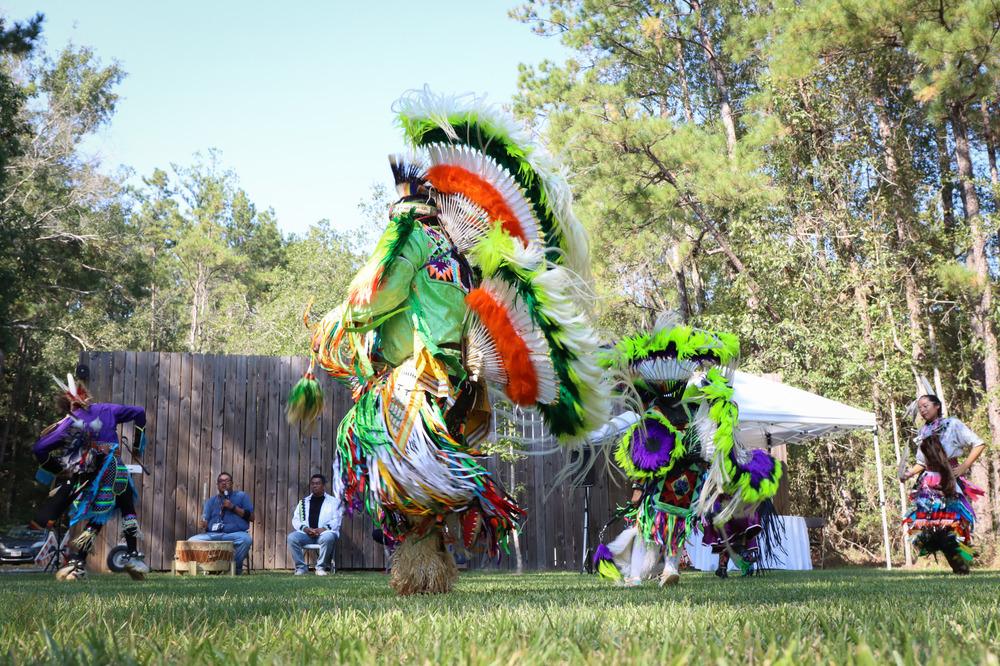
Members of the Alabama-Coushatta Tribe performed a series of dances during Big Thicket's 50th Anniversary Celebration / NPS
The National Park Foundation has announced $4.6 million in grants have been awarded to recipients in their Inclusive Storytelling program. The idea is to broaden the stories told around national parks, to better illustrate the wide range of experiences people have had there. "The National Park Foundation (NPF)’s Inclusive Storytelling program supports work that documents, preserves, and shares the voices and actions of people who are not often recognized as having shaped our history or for whom the struggle for social, racial, and environmental justice continues," says the NPF on their website.
This is the second year the NPF has awarded grant money to recipients in the storytelling program and the $4.6 million more than doubles the awards given out in the inaugural year.
The money goes to helping parks update interpretive programs, creating new storytelling avenues like podcasts, updating website language, new staff trainings, and exhibitions.
“While many people think of the stunning landscapes and wildlife they can see at our national parks, it's important to remember that every national park has a story to tell – a vital piece of our shared American story,” said Lise Aangeenbrug, NPF’s Chief Program Officer. “Our goal is to support parks in researching and telling these important stories in memorable and engaging ways.”
60 national parks and park units will receive funds from the program. Below is a small sampling of the kinds of campaigns funded by the program. A full list is available here.
Acadia National Park will partner with Wabanaki Youth in Science (WaYS) and Wabanaki Tribal cultural knowledge experts to develop a cooperative content-building process and create a suite of interpretive products.
Alaska Regional Office – National Park Service will lead a collaborative effort to broaden the introduction to Denali National Park to reflect Indigenous peoples’ presence in Denali and the landscape as well as Indigenous knowledge and cultural connection to the land.
Blackstone River Valley National Historical Park and Roger Williams National Memorial will conduct historical research into the contributions of one of the earliest and most prominent Jewish families in Providence, R.I. and share that knowledge using contemporary storytelling methods, educational materials, and a traveling exhibit.
Densho will partner with the Minidoka National Historic Site to launch a collaborative, educational curriculum for Japanese American Confinement Site interpretation staff that will enhance their skills, bolster their historic understanding, and highlight varied perspectives within the Japanese American community.
Grand Canyon Conservancy will employ Ancestral Lands Service Corps crews to transform the Desert View area – a developed site along the South Rim of Grand Canyon National Park – from a scenic overlook and visitor services area into an inter-Tribal cultural heritage site.
Lewis and Clark National Historic Trail will bring African American and Tribal history together in a Tribal oral history project about the Lewis and Clark Expedition.
National Park Service Natural Sounds and Night Skies Division will develop a suite of videos on Indigenous night sky storytelling in collaboration with multiple parks and their Tribal partners, and the videography department at Colorado State University.
Zion National Park Forever Project will create up-to-date interpretive media and implement as temporary exhibits, waysides, in-person programming, and other forms in locations across the park. A key part of the project will involve working with partner organizations to train staff on how to effectively tell the park’s deep history.

 Support Essential Coverage of Essential Places
Support Essential Coverage of Essential Places






